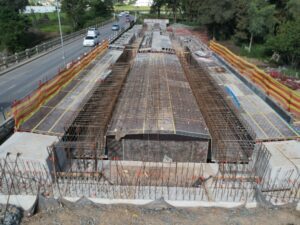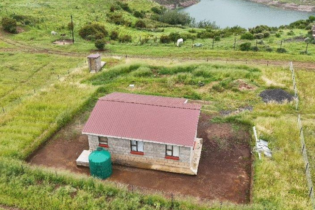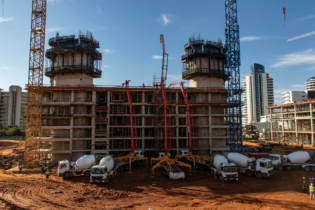Mariswe has a large and diverse team of technical experts with a proud reputation of excellence in designing and managing transportation construction projects in South Africa and several other African countries.
During 2022, Mariswe celebrates its 50th year as a South Africa-based project management, infrastructure planning and consulting engineering practice. Here, the firm’s Transportation Division has played a very meaningful role in its half-century. For the Mariswe team dedicated to transportation infrastructure, this has been a period of exploration, networking, growth and change, frequent reassessment, and dedication to fulfilling client needs through professionalism and innovation. Mariswe’s transportation sector clients continue to be its most loyal across the business. Deeper inspection of what drives transportation projects at Mariswe reveals core principles that are shared by all – passion for the job, quality of service, finding solutions, as well as the space to innovate, agility and investment in people, among others. Mariswe’s mantra – ‘Improving Lives. Engineering Solutions.’ – is taken seriously. If you don’t buy into this, you don’t work there. So, what has made Mariswe’s Transportation Division one of the strongest pillars of the company for 50 years? Complete solutions “We pride ourselves on taking complete solutions to the market,” explains Adrian Skea, Technical Director and Regional Head in the Western Cape, who plays a leading role in communications with SANRAL, one of Mariswe’s biggest clients in the South African transportation sector. “Importantly, we see ourselves as a diverse and highly experienced group of technical resources. It doesn’t matter where you sit, we will assemble a team from across our business to match every project – from tendering to completion. Each member of the team will bring different strengths and we will work together to find the optimum solution.” Skea stresses that Mariswe is more project centred than regionally centred as an organisation. “We pool resources wherever the project is located.” Excellent networking channels have been established internally over a long period to facilitate this approach. Importantly, Mariswe’s effective IT systems also kept communication flowing during the Covid-19 lockdown. “The team has worked together for many years and collaborates well to meet the toughest expectations,” adds Riyaaz Nieftagodien, Lead Engineer: Pavement Design and Materials. “Each member is experienced and well versed in their role, while still able to overlap and assist others within the discipline. The team is willing to explore and implement new design principles and construction practices to benefit the client. The quality of service has always been critical at Mariswe.” A changing world There are many potential aspects to a transportation project, Skea points out. “Just some of the areas we may need to populate are documentation preparation, business development, design, resourcing, planning, communication services, traffic and transport economics, geometric and structural engineering, GIS (Geographic Information Systems), hydraulics and hydrology. So, we are able to draw technical expertise for a single project from every business unit within Mariswe – Transportation, Water and Sanitation, Structures, Infrastructure Planning, Management Services, and the Strategic Projects Unit.” For example, Lisa Cotton, Executive Manager: Transportation KZN, says GIS mapping has become critical where minimal or no survey data is available, but high-level solutions are needed in the planning and feasibility stages of transportation projects. “GIS also enables a holistic assessment of a region or country’s transportation needs, which we use when developing transport masterplans,” she explains. “We are seeing opportunities to apply our transportation engineering skills, coupled with our GIS capability, to major transport routes damaged by climate-change-related disasters such as flooding. We are widening our focus from traditional mainstream projects to respond to a changing world. This requires a broader combination of skill sets.” Alternative contracting methods Contracting methodologies are a big part of responding to different project conditions and requirements. Mariswe’s home-grown iCU (Integrated Construction Unit) contract is a construction risk management methodology that responds well to changes in the pace, nature, scope and sequence of the works. The iCU system offers contractual flexibility, cost savings, reduced lead times, and fewer disputes. It has been used multiple times on contracts across Africa. In addition, proving the value of alternative contracting methods such as EPCM (Engineering, Procurement, and Construction Management) and OPRC (Output and Performance-Based Road Contracts) have become second nature for Mariswe. The firm has been singled out as one of the few African consultants specialising in OPRC and has OPRC projects currently under way in Rwanda and Zambia, following successful assignments in Ghana and Lesotho. The OPRC methodology gives the contractor responsibility for the detail design and construction of the roadworks, as well as the ongoing road maintenance for a certain period. OPRC projects allow road authorities to provide efficient road services and infrastructure to communities by expanding the role of the contractor. Ultimately, this contract delivers better roads for more people for longer durations. Strategic Projects Unit
Mariswe’s recently established Strategic Projects Unit (SPU) takes this pioneering spirit further by exploring exciting new opportunities. “We are showcasing our expertise in new sectors, from new sources, and throughout the project life cycle from inception to closure,” explains Rod Stewart, who heads the Management Services Division and is responsible for the new venture. This illustrates the firm’s
appetite for innovation and gives the Transportation business unit wider scope to offer pioneering solutions.







